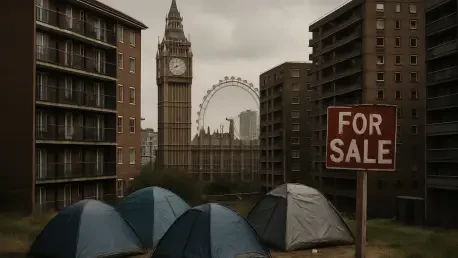In a city where the demand for affordable housing far outstrips supply, London Mayor Sadiq Khan faces mounting pressure as recent data reveals a stark shortfall in meeting his ambitious construction goals, with only a fraction of the planned homes breaking ground. Between April and June, a mere 347 affordable homes started construction, a pace that falls drastically short of the target to initiate 19,000 new homes by March of the following year. With only 5,500 homes started so far, the gap between aspiration and achievement paints a troubling picture for a metropolis grappling with skyrocketing rents and an escalating cost of living. This persistent housing crisis not only burdens residents but also raises questions about the feasibility of current strategies and the leadership steering them. As the situation unfolds, both critics and defenders of Khan’s administration weigh in on the challenges, offering contrasting views on how to bridge this divide and address the urgent needs of Londoners seeking stable, affordable places to call home.
Challenges in Construction Pace
The slow rate of affordable housing development in London has become a focal point of concern, with figures from the Greater London Authority highlighting just how far behind the city is from meeting its targets. Critics point to systemic issues and bureaucratic delays as key contributors to this lag, noting that the current trajectory makes it nearly impossible to achieve the planned numbers in the near term. Lord Bailey, the Conservative Housing Spokesman for London and a former mayoral candidate, has been vocal in his assessment, describing Khan’s efforts as falling short of what is required to ease the burden on residents. Rising rents and mortgage costs continue to squeeze households, amplifying the urgency for swift action. This criticism underscores a broader frustration with the pace of progress, suggesting that without significant changes in approach or policy, the housing crisis will only deepen, leaving many Londoners struggling to secure a foothold in an increasingly unaffordable market.
Defending the Mayor’s Efforts
Amid the wave of criticism, a spokesman for Mayor Khan has pushed back, emphasizing the administration’s commitment to tackling the housing shortage head-on. Highlighting a notable achievement, the spokesman pointed out that the previous year marked the highest number of affordable homes for social rent completed in a decade, signaling tangible progress despite the challenges. Efforts to boost supply include bold moves such as considering the release of portions of London’s green belt for development and working closely with government bodies to overcome delays tied to the Building Safety Regulator. These steps reflect a determination to navigate complex obstacles and prioritize housing as a critical issue. While acknowledging that targets remain unmet, the defense rests on the idea that incremental successes and proactive planning lay the groundwork for long-term solutions, offering a counterpoint to the narrative of failure with evidence of ongoing dedication to London’s housing needs.
Navigating a Complex Crisis
Looking back, the journey to address London’s housing crisis under Sadiq Khan’s leadership reveals a landscape marked by ambitious goals clashing with practical hurdles. The sharp contrast between the low number of homes started and the towering targets sets a tone of urgency that shapes public discourse. While critics like Lord Bailey spotlight perceived shortcomings, the Mayor’s team counters with records of achievement and strategic initiatives aimed at overcoming entrenched barriers. As the debate unfolds, it becomes clear that resolving this issue demands not just construction but innovative policies and collaboration across sectors. Moving forward, the focus should shift to accelerating approvals, securing funding, and rethinking land use to ensure more homes reach completion. Exploring partnerships with private developers and streamlining regulatory processes could also pave the way for progress, offering a path to alleviate the strain on Londoners and build a more inclusive urban future.









